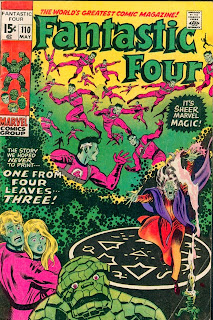The cover image here is the first variant cover from The Fantastic Four and I think it might be the first variant cover from Marvel. Although it wasn't an intentional one!
The story, from 1971, is fairly unremarkable relative to other issues for a good stretch both before and after it. Stan Lee had been writing the series for a full decade at that point, and John Buscema had several issues under his belt after Jack Kirby left* and would continue on for a few years afterwards. There are no new charaters introduced, nor are any storylines started or wrapped up. It's not a bad story, by any means, but it's largely unremarkable relative to any other given post-Kirby FF.
Except for the cover.
Fantastic Four #110 was produced in exactly the same way every other issue was produced. Lee provided a general outline to Buscema. Buscema created the story and drew the art. Lee came back and added dialogue. It went to Joe Sinnott to ink, and one of the "house" letterers to letter. (In this case, Mike Stevens.) Then the whole ball of wax got shipped off to the printers to do a print run of 250,000 or so.
Quick lesson in printing. You know how your ink jet printer has four cartridges of ink, right? Black, yellow, blue (cyan) and pink (magenta). Those four colors are used because when they're mixed in the right quantities, you can produce an incredibly wide range of colors. Professional printers who print comics use the same colors. The difference is that back in 1971, instead of being controlled by a computer, the colors were controlled by hand. There would be a person who had to take a copy of the artwork, and physically cut out all the bits that required each color. They would end up with four pieces of art: one containing just the black parts, one containing just the yellow parts, one containing just the cyan parts, and one containing just the magenta parts.
Then, a printer would create a metal plate based on each piece of art. These plates are kind of like rubber stamps, but just made out of (usually) aluminum. The image is reversed, then coated with ink and pressed onto a piece of paper. So when you coat the four images with four different inks, and press them onto the same piece of paper, you get a colored image!
Now, what happened to FF #110 is that the cyan and magenta plates got mixed up for the cover. So everything that was supposed be blue was printed using magenta ink, and everything pink was printed with cyan ink. Consequently, we see the FF in pink uniforms, and the orange of the Thing (remember your old color wheel? yellow + red = orange) now looks green (the "red" of that equation was replaced with "blue").
The issues were shipped out before the problem was noticed. Which means there were over 200,000 of these floating around at one point. Marvel issued a recall, and had corrected issues shipped out (I'm sure at the printer's cost, since it was their fault) but not before a good number of the error version had sold. And while we weren't really into the direct market system quite yet, there were no doubt people who had begun speculating on the market, and deliberately held onto their copies without sending them back to get pulped. So these days, they're not exactly common, but not terribly hard to find either.
So the next time someone talks about some exclusive variant cover they picked up at a convention, you can pull this bad boy out and tell them you've got the original variant cover!
* Yes, I know John Romita did a few issues between Kirby and Buscema, despite the implication my phrasing above implies. There just wasn't a smooth way to add in Romita's contribution there, and it wasn't really relevant to my point anyway.
The Original Fantastic Four Variant
By Sean Kleefeld | Monday, June 14, 2021
2 comments







2 comments:
Did I ever mention how my subscription copy of Doom 2099, one month, was actually that month's cover stapled to the interior of that month's issue of Ghost Rider 2099? No idea how many copies that happened with.
Hmmm, I wonder where that got garfed up. Mid-90s, that could potentially have been sent to the printers electronically and someone uploaded the wrong file. A press check would've caught that, of course, but I don't know where Marvel was having their books printed at that point, so that might not have been practical. It could have been a collating issue, obviously, but that would've required the printer to mix up two distinctly different jobs, which seems a little harder to do.
Post a Comment